Nebraska Lawmakers Hold Hearing on Cannabis Legalization Bills

Nebraska Holds Hearings on Two New Cannabis Legalization Bills
Nebraska is on the brink of a significant policy shift as lawmakers held initial committee hearings on two newly filed marijuana legalization bills. The two proposals, LB 52 from Sen. Justin Wayne (D) and LB 71 from Sen. Terrell McKinney (D), aim to legalize and regulate cannabis, promising potential tax revenue and social equity initiatives. These bills were filed during a special legislative session called by Gov. Jim Pillen (R) to address property tax issues.
Introduction of LB 52 and LB 71
Sen. Justin Wayne’s bill, LB 52, spans 162 pages, while Sen. Terrell McKinney’s bill, LB 71, is 165 pages long. Both bills were introduced in the Judiciary Committee during a joint hearing, an agenda item that drew light-hearted laughter from the committee chamber.
McKinney’s Argument for Legalization
Sen. McKinney introduced LB 71 by emphasizing the long-lasting harms inflicted by the war on drugs, particularly on Nebraska families. He argued that criminalizing marijuana use and possession has failed to deter its use and has instead destabilized communities and torn families apart for nonviolent offenses. McKinney pointed out that many states have already moved to legalize cannabis and are reaping the benefits of regulated markets.
Revenue Generation and Allocation
One of the standout features of LB 71 is its potential to generate substantial tax revenue. McKinney highlighted that legalizing marijuana could provide significant tax relief and funding for education, business development, and community initiatives. A fiscal note on LB 71 estimates that the measure could bring in $18.9 million in fiscal year 2025, increasing to $98.0 million by fiscal 2028. Annual state expenses for operations are projected to start at $1 million, rising to $2.5 million by 2028.
Wayne’s Comprehensive Framework
Sen. Wayne’s bill, LB 52, proposes a comprehensive framework for the cultivation, distribution, and sale of cannabis. It reclassifies cannabis, removing it as a controlled substance, and establishes stringent operational standards for cannabis enterprises. These include secure facilities, child-resistant products, and prevention of sales to individuals under twenty-one. The bill mandates a seed-to-sale tracking system and imposes packaging and labeling requirements to ensure safety.
Fiscal Impact of LB 52
The fiscal note for LB 52 projects even higher revenue than McKinney’s bill, starting at $29.5 million in fiscal 2025 and rising to $153.1 million by fiscal 2028. Operational costs are expected to be similar to those associated with LB 71.
Law Enforcement and Health Department Stance
Opposition to the legalization proposals came from law enforcement representatives, the state’s Department of Health and Human Services (DHHS), and anti-cannabis advocates. Nebraska State Patrol Col. John Bolduc argued that legalization in other states has fueled illicit markets and increased hospitalizations. DHHS’s Robert Donovick raised concerns about the health risks associated with cannabis use, including motor vehicle fatalities, psychosis, and schizophrenia.
Legal and Economic Counterarguments
Zachary Viglianco, deputy solicitor general with the state attorney general’s office, also spoke against the bills, citing increased rates of heart attack, cancer, and mental health issues associated with cannabis use. Opponents argued that revenue from a regulated cannabis industry wouldn’t solve Nebraska’s budget issues, pointing out that cannabis revenue has fallen in some states as markets mature and prices decline.
Support from Civil Liberties Organizations
Jason Witmer, policy fellow at ACLU of Nebraska, testified in support of the proposals, arguing that criminalizing cannabis serves as a gateway to prison rather than addressing public safety. He highlighted the disproportionate impact of cannabis arrests on Black Nebraskans, who were three times more likely to be arrested for cannabis possession as of 2018.
Legislative Reactions
Sen. Carol Blood (D) was notably active during the hearings, challenging hyperbolic claims by opponents and emphasizing the need for a balanced view on cannabis legalization. Both Wayne and McKinney pointed out that many arguments against marijuana could also apply to legal substances like alcohol and tobacco, advocating for a regulated approach to ensure safety and reduce youth participation.
Special Session and Property Tax Relief
While the special legislative session was called to address property tax issues, Sen. Lou Ann Linehan (R) introduced a sweeping property tax relief bill, LB 1, which includes a 30 percent tax on consumable hemp products. This proposal has faced criticism from hemp companies and consumers, who argue that it could harm local businesses and push consumers to neighboring states with lower prices.
Efforts for Medical Cannabis Legalization
Citizen activists are also working to qualify two medical cannabis initiatives for November’s ballot. A recent poll by the campaign found 70 percent support in the state for legalizing medical marijuana. Previous efforts have been hindered by legal challenges and funding issues, but organizers remain determined to let voters decide on the reform.
The hearings on LB 52 and LB 71 mark a critical moment for marijuana legalization in Nebraska. With significant potential for tax revenue and social benefits, these bills represent a comprehensive approach to regulating cannabis. Despite opposition and regulatory challenges, the proposals have sparked a crucial conversation about the future of cannabis policy in the state.











